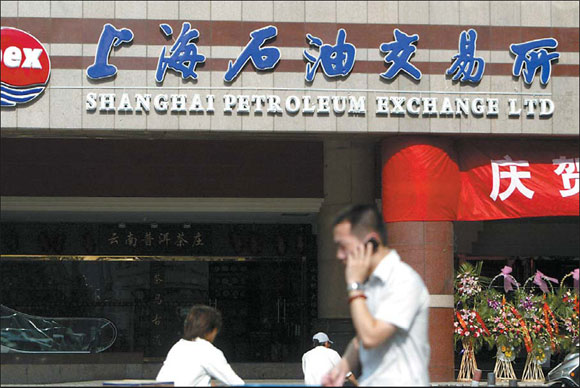
|
BIZCHINA> News
 |
|
Bourses face uncertain future
By Wen Xin (China Daily)
Updated: 2008-06-16 09:42  Despite its limited functions under the Chinese government's price control mechanism, the Shanghai Petroleum Exchange (SPE) has served as a platform to facilitate domestic oil traders to enter into spot or forward contracts by providing them with real-time industry information and settlement service. The bourse, established in November 2007, trades in a range of petroleum products, including fuel oil and gasoline and various oil-based chemicals. Separately, Shanghai Futures Exchange (SHFE) began trading in fuel oil futures contracts in August 2004. Trading in oil futures contracts is possible because there is no control on its spot price. Future development of these two markets, of course, will depend on the progress of price liberalization, oil traders and industry analysts say. "Under the present situation, it is difficult for Shanghai Futures Exchange and Shanghai Petroleum Exchange to fulfill their function of price discovery," says Lin Hui, an analyst at Orient Securities in Shanghai. "Other futures contracts on petroleum products cannot be launched until their spot prices are fully dictated by supply and demand conditions in the domestic market," Lin adds. To be sure, the dismantling of the price control mechanism is unlikely to happen anytime soon because of inflationary pressure. But many economists and industry experts believe that it may be possible to gradually allow the prices of petroleum products to reflect global crude prices and domestic market forces. "It is a natural trend to gradually leave oil product prices to market forces based on true supply and demand," says Zhou Zhiqiang, an analyst at Great Wall Futures Co in Shanghai. "A 50 percent price disparity of petroleum products between domestic and global markets is causing an excessive energy consumption in China, which is leading to a waste of natural resources in the longer term," Zhou added. The establishment of an efficient domestic oil market calls for diversified participants and a supply-and-demand-relation based price mechanisms, industrial analysts say. The two Shanghai markets are a positive step in paving the way for the full globalization of China's oil market. "Oil refiners have to passively accept the petroleum price disparity between international and domestic markets as government price curbs prevented them from passing the rising crude oil cost to end users," says Zhao Xianbing, a specialist on the petroleum industry at CITIC's China Securities. China has become a major consumer and importer of crude oil, whose price had soared from $100 per barrel to around $139 per barrel over the past weeks. According to the latest figures from the Ministry of Commerce, in the first four months of 2008, the price of imported crude oil increased by 9.8 percent to 59.77 million tons from the earlier year period while the imported refined oil products rose 9.2 percent to 12.69 million tons. During the first four months of 2008, the prices of imported crude oil averaged $674 per ton, up 64.7 percent from the earlier year period. Meanwhile, prices of imported refined oil products were averaged at $684.5 per ton, up 63.6 percent from the year before. Fuel oil futures contracts, starting trading on SHFE from Aug 27, 2004, were as yet the only petroleum futures product being traded in China. On SPE, there are some 10 State-owned companies allowed to trade crude oil. Although a total of more than 3,000 companies are engaged in trading of refined oil products in China, the government price curbs on refined oil products make the trading far less active than other markets in the world. Nowadays the international market takes WTI (West Texas Intermedium) futures prices quoted on New York Mercantile Exchange and Brent futures prices on London's International Petroleum Exchange (IPE) as benchmark prices. Industrial analysts say that in order to function smoothly, both spot and futures markets need an expanding participants base and a market-dictated price mechanism, which can fully reflect supply and demand relation. Industrial analysts suggested allowing private and international oil refiners access to spot and futures markets in order to increase the market liquidity and bring the two bourses into full play. "The quite limited trading volume in the Shanghai Futures Exchange and Shanghai Petroleum Exchange has much to do with the price controls on petroleum products," says Zhao. "Of course, it is not a good timing to lift the price curbs on petroleum products at a time when the domestic inflation pressure is mounting," says Zhou Zhiqiang at Great Wall Futures. (For more biz stories, please visit Industries)
|